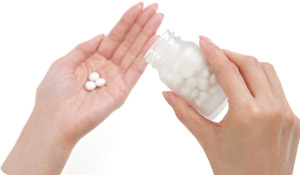
Could the popular supplement coenzyme Q-10 (also known as Co Q-10) be the answer to your fatigue, muscle pain, and even heart health concerns?
This naturally occurring, fat-soluble, vitamin-like substance is present in tissues throughout the body, especially in the heart, liver, pancreas, and kidneys. Our bodies produce it, we consume it in meats and seafood, and itís also available over the counter as a supplement.
"Coenzyme Q-10 as is an antioxidant that scavenges free radicals and gobbles them up. Free radicals [unstable molecules that occur during a variety of body processes, according to the National Center for Complementary and Alternative Medicine] can damage cells and lead to diseases like cancer and heart disease," says Carrie Baldwin-Sayre, ND, associate dean of clinical education and an assistant professor in the School of Naturopathic Medicine at the National College of Natural Medicine in Portland, Oregon. "Co Q-10 also assists in strengthening muscles, including the heart muscle. Plus, it helps supply energy to muscles and helps people feel a little more energetic."
Co Q-10 is often taken to help treat cardiovascular (heart and blood vessel) conditions, diabetes, various cancers, muscular and neurologic disorders, and conditions that might limit energy production in the bodyís cells. Itís also sometimes taken to improve exercise performance. But does it work?
The Natural Medicines Comprehensive Database says it is likely effective for treating coenzyme Q-10 deficiency, which Baldwin-Sayre says most doctors (other than naturopaths) rarely test their patients for. Itís also possibly effective for helping treat age-related vision loss, congestive heart failure, diabetic neuropathy, immune function related to HIV/AIDS, Huntingtonís disease (a rare inherited disorder), and may have a mild effect on lowering blood pressure. Itís also possibly effective for relieving migraines and assisting in treatment of muscular dystrophy. Itís probably ineffective, however, for treating Alzheimerís disease, Lou Gehrigís disease, high cholesterol, and for assisting in athletic performance. Thereís insufficient evidence to rate effectiveness for helping treat cancer and many other diseases.
Is it safe? Baldwin-Sayre says that most of the side effects associated with Co Q-10 are the same ones mentioned for virtually every supplement, and none of them are significant enough to prevent most patients from taking them. Nonetheless, "Itís very important that before patients who are being treated with certain blood pressure and blood thinning drugs start taking Co Q-10, they discuss it with their physician," Baldwin-Sayre says. "A few of these drugs can affect the way Co Q-10 interacts in the body and [it] may not be recommended for these patients."
If youíre interested in trying a Co Q-10 supplement, be sure to purchase a good formulation. "Youíll find Co Q-10 on store shelves in two forms," explains Baldwin-Sayre. "One is called ubiquinol and the other is ubiquinone. Youíll want to purchase ubiquinol because it is better absorbed and utilized by the body than ubiquinone. Youíll notice, however, that ubiquinol is the more expensive of the two forms."
In addition, "It also comes in a variety of dose ranges. Various studies recommend different doses, but in general, we recommend taking 50 to 200 mg per day for most conditions."
But before you take any new vitamin, supplement or over-the-counter remedy, talk to your doctor about whether or not itís appropriate for you.
Carrie Baldwin-Sayre, ND, reviewed this article.
Sources
Carrie Baldwin-Sayre, ND. Associate dean of clinical education, assistant professor, School of Naturopathic Medicine, National College of Natural Medicine. Interviewed January 5, 2015.
"CoenzymeQ10." MedlinePlus/National Library of Medicine/National Institutes of Health. Page last reviewed October 20, 2014.
"Antioxidants and Health: An Introduction." National Center for Complementary and Alternative Medicine (NCCAM). Last updated November 2013.





